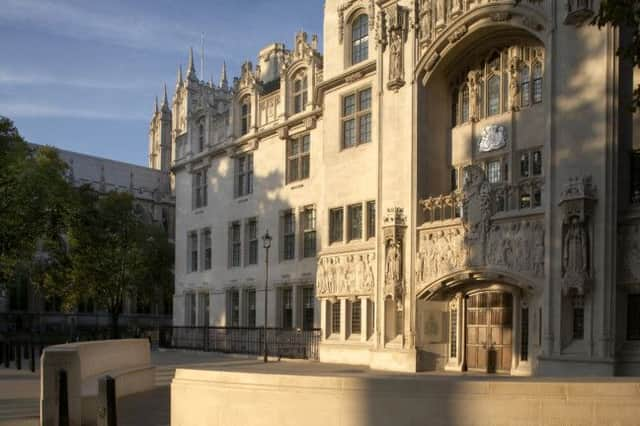Liberty fundamental to all human beings


TWO cases which have reached the UK Supreme Court on appeal from the Court of Appeal in England and Wales raise an important question: Do the living arrangements made by public authorities for a mentally incapacitated person amount to deprivation of liberty?
Strictly speaking, the cases – P v Cheshire West and Chester Council and MIG & MEG v Surrey County Council – concern the criteria on this specific issue in England and Wales. The law of incapacity in Scotland is governed by the Adults with Incapacity Act 2000 and Mental Health (Care and Treatment) Act 2003.
Advertisement
Hide AdAdvertisement
Hide AdHowever, as the right to liberty is a fundamental human right – enshrined in Article 5 of the European Convention of Human Rights and Fundamental Freedoms – the court’s decision is likely to have implications in Scotland.
Article 5 provides that everyone has the right to liberty and security of person. If physical liberty is interfered with by the organs of the state, it has to be justified. The issue before the court was whether authorisation of restrictions and limitations can continue indefinitely or whether there must be some periodic independent check upon whether the placements made are in the best interests of those concerned.
This decision will provide guidance to health and social care bodies and others operating in the public sphere responsible for the healthcare and welfare of those affected by impairment.
The appeal concerned three individuals with disabilities and a range of care and supervision needs. In the judgment they are described as MIG, MEG and P.
• MIG had difficulties with understanding and communicating. She was placed in foster care. She had never attempted to leave the home by herself. If she did, she would have been restrained by her foster mother for her safety.
• MEG was able to communicate, but exhibited challenging and aggressive behaviour. She was moved from foster care as her behaviour could not be managed and placed in a residential care home. She sometimes required physical restraint. She was accompanied by staff when she went out of the home.
• P was born with cerebral palsy and Down’s syndrome and required 24 hour care. His accommodation was arranged by the local authority.
The Supreme Court held, in the appeal of P unanimously and by a majority of 4-3 in the appeals of MIG and MEG, that they have been deprived of their liberty.
Advertisement
Hide AdAdvertisement
Hide AdIt was argued on behalf of the local authority that without restrictions and limitations, they could not survive. However, Lady Hale said: “It is axiomatic that people with disabilities, both mental and physical, have the same human rights as the rest of the human race. It may be that those rights have sometimes to be limited or restricted, but the starting point should be the same as that for everyone else.”
Lord Kerr held that “benevolence underpinning a regime which restricts liberty is irrelevant to an assessment of whether it in fact amounts to deprivation of liberty”.
He said placing restrictions on someone’s liberty for their own good does not transform the restrictions into something less constraining. Deprivation of liberty, he said, is to be judged principally as an objective condition.
Courts cannot lay down a prescriptive list of criteria. There is no acid test for the deprivation of liberty. It was held that in order to determine whether someone has been deprived of his liberty, the starting point must be his or her concrete situation and account must be taken of a whole range of criteria such as the type, duration, effects and manner of implementation of the measures in question.
Lady Hale also pointed out: “There is a fundamental principle to be derived from Strasbourg case law stating that article 5(1) must be construed as laying down a positive obligation of the state to protect the liberty of those within its jurisdiction. The state is obliged to take measures providing effective protection of vulnerable persons, including reasonable steps to prevent a deprivation of liberty of which the authorities have or ought to have knowledge.”
Accordingly, as a matter of policy, periodic independent checks are necessary for extremely vulnerable people like those appealing to ensure that the arrangements made remain in their best interests. The purpose of article 5 is to ensure that people are not deprived of their liberty without proper safeguards.
• Sindi Mules is a litigation associate with Balfour+Manson www.balfour-manson.co.uk
SEE ALSO